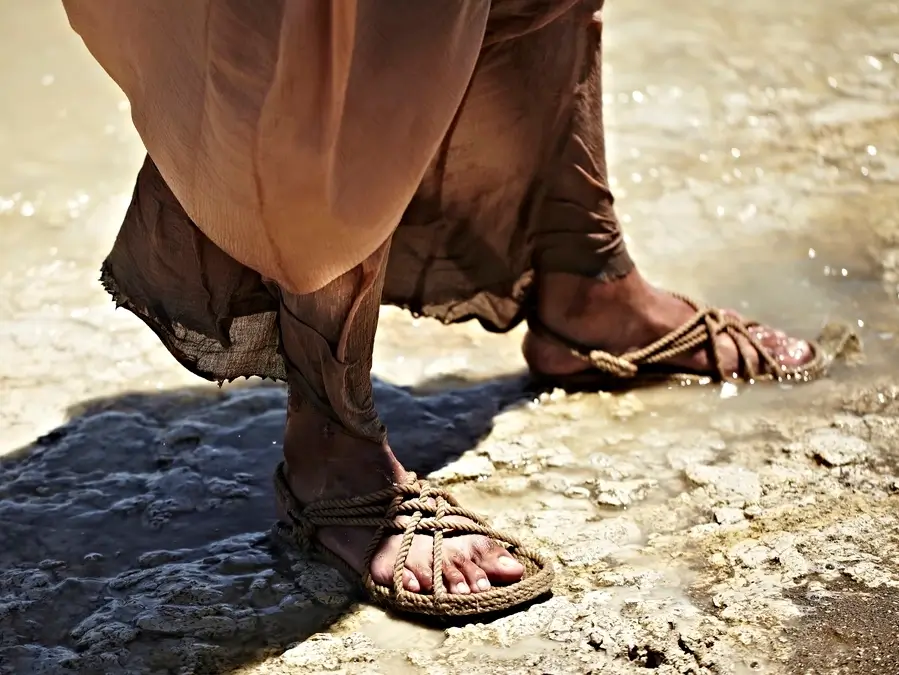
The Hike
Son
John 5:19–29

When did God become Father? The answer is that He has always been Father. He is the everlasting Father, and His nature never changes. When did Christ become the Son? The answer is that He has always been the Son. He is the eternal Son, and His nature never changes. The Father was never without the Son, and the Son was never without the Father.
I became a father in 1986 when my son Andrew was born. Before I had a son, I could not have been described as a father. It is the birth of a son or daughter that makes a man a father or a woman a mother. But God did not gain a son when Jesus was born into the world. God sent His Son, who was already “at the Father’s side” (John 1:18).
The Bible makes it clear that the Son is equal with the Father (5:18). Before He took our flesh, God the Son shared the Father’s glory (17:5), the Father’s life (5:26), the Father’s activity (1:3), and the Father’s love (17:24). He is in very nature God, but He did not count this equality something to be grasped (Philippians 2:6). He placed Himself at the disposal of the Father and took on the form of a servant.
On one occasion, Jesus said, “The Father is greater than I” (John 14:28). This would be like me saying, “The president of the United States is greater than I.” I share a common humanity with the president, but clearly his position is greater than mine.
So, when Jesus said, “The Father is greater than I,” He did not mean that the Father is more divine, but that the Father had a more exalted position. The Father was in heaven and Jesus was on His way to the cross. This is why Jesus said to His disciples, “If you loved me, you would have rejoiced, because I am going to the Father…” (14:28). Going to the Father meant returning to share His exalted position.
Like Father, Like Son
The Bible uses the word son in two ways. It can mean a dependent relative or a reflected nature.1
In the ancient world, a son followed in his father’s footsteps. If your father were a carpenter, you would be a carpenter as well. And if your father were a good carpenter, the quality of his work would be reflected in yours. As the old saying goes, “Like father, like son.”
In the New Testament, we read about a man whom the apostles nicknamed “Barnabas.” Barnabas means “son of encouragement” (Acts 4:36). It’s not difficult to imagine why the apostles gave him this name. They saw that Barnabas was a great encourager. He was encouragement personified, encouragement in human flesh.
Jesus used the word son in the same way in the Sermon on the Mount. “Blessed are the peacemakers,” He said, “for they shall be called sons of God” (Matthew 5:9). God is the great peacemaker, and when we make peace, we reflect His character.
So when the Bible describes Jesus as “the Son of God” (John 5:25) the word Son does not mean that He is a dependent relative of the Father, but that He exactly reflects the Father’s nature (Hebrews 1:3). The Son of God is all that God is, in human flesh.
Doing the Father’s Work
The full glory of what it means for Jesus to be the Son of God is opened up for us in John 5, where Jesus says, “Truly, truly, I say to you, the Son can do nothing of his own accord, but only what he sees the Father doing” (John 5:19).
The activity of Jesus is limited to what He sees the Father doing. Christ is saying that He never does anything outside the range of what the Father would do. I wish I could say that everything I do is a reflection of the activity of God, but of course, I can’t say that. Yet that is exactly what Jesus is saying: “You will not find a single thing in My life that is outside of the range of the activity of God.”
Then Jesus makes a second statement that is even more astonishing: “Whatever the Father does, that the Son does likewise” (5:19). In other words, Jesus is saying, “Everything that I do reflects what the Father does, and everything the Father does is reflected in what I do.”
We may do some things that reflect what God does. When we love, forgive, or make peace, we reflect the nature of the Father. But there are some things that belong to God alone. Only God gives life. Only God raises the dead. God alone is the judge. These are God’s things, and Jesus tells us that He does them: “As the Father raises the dead and gives them life, so also the Son gives life to whom he will. For the Father judges no one, but has given all judgment to the Son” (5:21–22).
The Son Has Life in Himself
Your life is a gift from God through the union of your father and your mother. Without them you would not exist. Only God has life in Himself. He is the only being whose existence does not depend on anyone else.
But Jesus says, “As the Father has life in himself, so he has granted the Son also to have life in himself” (5:26). These words help us to gaze with wonder on the mystery of the Trinity. Notice that Jesus did not say, “The Father has life in himself and the Son has life in himself.” That would mean that there are two gods, both with life in themselves. Nor did Jesus say, “The Father has life in himself and he has granted the Son to have life.” That would mean that the Son was a created and dependent being just like you and me.
Jesus said, “As the Father has life in himself, so he has granted the Son also to have life in himself.” The Father and the Son share in the one eternal life of God.2
Put all this together and you will begin to see the glory of our Lord Jesus Christ. One day He will raise the dead and pronounce final judgment on all people, and He is able to give life to all who come to Him.
Knowing God: A Guess or a Revelation?
The New Testament places great stress on the identity of Jesus. He is God with us. And this truth is of central importance because if the Son were not God, we could not know the Father.
On one occasion, Philip said to Jesus, “Show us the Father, and it is enough for us.” Jesus replied, “Have I been with you so long, and you still do not know me, Philip? Whoever has seen me has seen the Father” (John 14:8–9).
I have a brother in England. He is like me in some ways but very different in others. I could not say, “If you have seen me, you have seen my brother,” because even though we come from the same parents, we are very different. To know me is not to know my brother.
If the Son were not God, we could not know the Father. The best we could say would be that someone who was with the Father came to tell us about Him. That would make Jesus like an angel or a prophet, but Jesus says, “Whoever has seen me has seen the Father” (14:9).
The Cross: An Act of Cruelty or a Gift of Love?
The Bible tells us that the Father laid the guilt and the punishment of our sins on His Son, and that this was a demonstration of God’s love (Isaiah 53:5–6; Romans 5:8).
But if the Son were not God, the cross would be an act of cruelty, not a gift of love. God would then have picked on some person in His creation and poured out what everyone else deserved on him. What kind of justice would that be?
If the Son were not God, we would have to rewrite Romans 5:8: “God shows his injustice in that while we were still sinners, Christ died for us.” But the Son is God, and at the cross, it was God who bore our sins and gave Himself for us.
Before God created the world, He planned to redeem men and women so that they would share His glory forever. The plan involved great cost. It would mean God giving Himself, and that self-giving would be the ultimate display of His own nature and glory.
God’s self-giving would involve all the persons of the Trinity. The Father would send the Son. The Son would lay down His life. The Spirit would give Himself to every believer.
Consider the roles of the Father and the Son. Which of them had the easier part to play: the one who would give His Son, or the one who would lay down His life? The question is unanswerable. The Father and the Son were one in the infinite cost of self-giving and sacrifice for you and for me.
Salvation: Being Sure or Hoping for the Best?
If the Son were not God, you could never be sure of your salvation.
I phoned my credit card company recently because I wanted to upgrade my card. “Can I do this over the phone?” I asked. The representative was very helpful and assured me that I could.
A few days later I received a letter.
Dear Colin Smith,
Thank you for your recent inquiry regarding your credit card account. Unfortunately, we are unable to change your account as you requested. If you would like to change your account, please contact our customer service at the telephone number listed above.
Clearly, the representative had been overruled! She sincerely believed that my account could be changed over the phone, but she lacked the authority to make it happen.
What if it was like that with Christ? If Jesus were not God, there would always be the possibility of Him being overruled by a higher authority. And we would face the possibility of arriving at heaven’s gate only to find that we are not qualified to enter.
But the Father has entrusted all judgment to the Son (John 5:22), and the Son is in very nature God. Christ presides over the supreme court of the universe. There is no higher authority. So when the Son says you are forgiven, you are forgiven indeed!
Opened
Jesus is God with us, and for this reason we can truly know the Father through Him. His death on the cross is the ultimate demonstration of God’s love for us. God was reconciling the world to Himself in Christ (2 Corinthians 5:19). The deity of the Lord Jesus Christ is our assurance of salvation. Jesus said, “Truly, truly, I say to you, whoever hears my word and believes him who sent me has eternal life. He does not come into judgment, but has passed from death to life” (John 5:24).
Notes:
1. I gladly acknowledge my debt to Professor Don Carson for his work on the “Son language” of the New Testament. See especially D. A. Carson, The Difficult Doctrine of the Love of God (Wheaton, IL: Crossway, 2000), 31ff.
2. I am again indebted to Don Carson for this point, particularly in The Difficult Doctrine of the Love of God, 37–39.
John 5:19–29
The Authority of the Son
19 So Jesus said to them, “Truly, truly, I say to you, the Son can do nothing of his own accord, but only what he sees the Father doing. For whatever the Father does, that the Son does likewise. 20 For the Father loves the Son and shows him all that he himself is doing. And greater works than these will he show him, so that you may marvel. 21 For as the Father raises the dead and gives them life, so also the Son gives life to whom he will. 22 For the Father judges no one, but has given all judgment to the Son, 23 that all may honor the Son, just as they honor the Father. Whoever does not honor the Son does not honor the Father who sent him. 24 Truly, truly, I say to you, whoever hears my word and believes him who sent me has eternal life. He does not come into judgment, but has passed from death to life.
25 “Truly, truly, I say to you, an hour is coming, and is now here, when the dead will hear the voice of the Son of God, and those who hear will live. 26 For as the Father has life in himself, so he has granted the Son also to have life in himself. 27 And he has given him authority to execute judgment, because he is the Son of Man. 28 Do not marvel at this, for an hour is coming when all who are in the tombs will hear his voice 29 and come out, those who have done good to the resurrection of life, and those who have done evil to the resurrection of judgment.
(ESV)
Use these questions to further engage with God's Word. Discuss them with another person or use them as personal reflection questions.

Take the First Step to Open Your Bible
Join 35,000+ people who get ‘Open Weekly’. Every Wednesday, you’ll get hand-picked resources designed to inspire, encourage, and challenge you in opening your Bible.
Listen NOW!
The HIKE Through the Bible podcast is now streaming! Join Pastor Colin for a leisurely hike through the entire Bible story. In every episode he reads a chapter from his new book HIKE Through the Bible and then discusses it with some friends.
Join Pastor Colin In-Person!
Do you want to understand the Bible story? 📖
Pastor Colin Smith’s upcoming event FLY THROUGH THE BIBLE, is a high-altitude exploration of the entire Bible story. This brief introduction to the Bible will help you grasp who God is, who you are, who Jesus is, and what He offers to you!
Coming to 4 cities this fall:
- St. Louis, Missouri
- Twin Cities, Minnesota
- Des Moines, Iowa
- Indianapolis, Indiana
Will you join us?

It looks like you're viewing the site from outside the US. Click below to visit our UK site or close this pop-up to view the international site.



